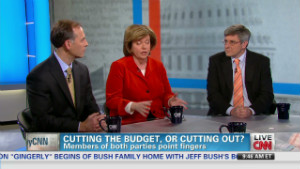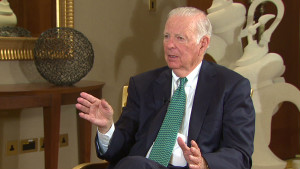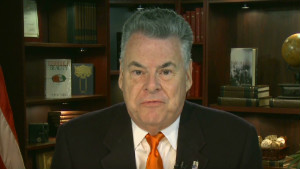Washington (CNN) -- Congress returned to work on Monday amid the first full week of forced spending cuts, with President Barack Obama and Republicans sticking to deeply entrenched positions that have caused a series of showdowns manufactured by Washington politics.
Most predicted impacts of the $85 billion in cuts that took effect on Friday night -- such as unpaid furloughs for government workers -- won't be evident until April at the earliest, officials say.
But some impacts were already being felt.
 Cutting the budget, or cutting out?
Cutting the budget, or cutting out?  National parks face 'damaging' cuts
National parks face 'damaging' cuts  Baker: Without dollar, we'd be Greece
Baker: Without dollar, we'd be Greece  Rep. King: Obama hasn't shown leadership
Rep. King: Obama hasn't shown leadership Homeland Security Secretary Janet Napolitano told reporters that customs lines for passengers arriving from overseas at some international airports over the weekend were longer than usual due to the spending cuts.
At New York's John F. Kennedy International Airport, more than 50 flights had wait times exceeding two hours and 14 were over three hours, according to Jenny Burke, a spokeswoman for Customs and Border Protection.
"These wait times are not typical for this time period, and are related to decreased booth staffing," Burke told CNN.
In Cody, Wyoming, the local chamber of commerce said Yellowstone National Park will delay the opening of its North and West entrances by a week until April 26, and its East, South and Northeast entrances by two weeks until mid-to-late May due to the impact budget cuts will have on snow removal. The delay will cost related businesses several million dollars, according to the group's estimates.
At an education conference in Washington, school superintendents outlined the impact of the federal government's latest fiscal saga on on their operations, which included job cuts in some cases.
Susan Smit, a superintendent in Wagner, South Dakota, said her district prepared last year in anticipation of reduced federal funding.
"We had to make the cuts," Smit said, noting that changes included reduced health benefits and staff members who were not rehired.
Meanwhile, the partisan rhetoric by both sides seeking to cast blame on the other continued unabated, signaling continued political brinksmanship over tax and spending issues beginning with the March 27 deadline for Congress to authorize funding to run the government until the current fiscal year ends on September 30.
In a first salvo by House Republicans on Monday, their proposal for the government funding measure -- known as a continuing resolution -- sought to soften the impact of the spending cuts on defense and security spending.
Under the proposal unveiled by House Appropriations Committee Chairman Hal Rogers, R-Kentucky, the total government spending for the fiscal year would adhere to the figure negotiated by Obama and Congress minus the cuts.
However, the proposal would allow Pentagon officials to shift funding to protect top priority programs, and also include provisions to maintain FBI and border security spending.
In addition, it would prohibit any spending for transferring terrorism suspects from the Guantanamo Bay, Cuba, detention facility or for renovating a mainland prison to accept such detainees -- a political issue rather than a core spending matter.
House Speaker John Boehner, the top Republican negotiator on fiscal issues, told NBC's "Meet the Press" in an interview broadcast Sunday that he was "hopeful" for a funding agreement to prevent a partial government shutdown on March 27.
Senate Republican leader Mitch McConnell offered a similar prediction on CNN, saying, "I believe we're going to be able to work out passing the continuing resolution later in March on a bipartisan basis through both the House and the Senate."
In reaction to Boehner's comments, the White House issued a statement that stressed its support for a continuing resolution that is "clean" from unrelated items.
It said Congress should act separately to replace the forced spending cuts with alternatives that will be less harmful to the economy.
Obama made clear Friday that the current law requires cuts this fiscal year, which are the first installment of about $1 trillion in spending reductions over the next decade, to be reflected in the continuing resolution to fund the government.
At his first Cabinet meeting of his second term on Monday, the president warned of impending hardship from the forced spending cuts.
"We're going to do our best to make sure that our agencies have the support they need to try to make some very difficult decisions, understanding that there are going to be families and communities that are hurting and that this will slow our growth," Obama said. "It will mean lower employment in the United States than otherwise would have been, but we can manage through it."
In the NBC interview, Boehner said he was uncertain if the forced cuts -- known in Washington jargon as sequestration -- would hurt the economy, as predicted by Obama, economists and most Democrats and Republicans.
OMB outline of spending cuts
Boehner argued in a recent op-ed that the cuts would threaten "U.S. national security, thousands of jobs and more," but he told NBC that "I don't think anyone quite understands how the sequester is really going to work."
Obama had argued at a news conference on Friday -- a few hours before he signed an order implementing the mandatory cuts -- that any resulting harm to the economy would be the fault of GOP intransigence.
"Every time that we get a piece of economic news over the next month, next two months, next six months, as long as the sequester is in place, we'll know that that economic news could have been better," he said then.
The two sides remain ideologically opposed on how to reduce the nation's chronic federal deficits and debt.
Republicans seek to shrink the size of government to lower costs, while Democrats argue some new tax revenue is necessary to maintain the social safety net that protects the elderly, disabled and impoverished.
Polls show the public is about as politically divided as its leaders. While most Americans support a deficit reduction plan that includes spending cuts and increased revenue, as well as entitlement reforms, there is little agreement on the formula for such a package.
In addition, a Pew Research Center poll last week showed that a majority of respondents opposed cuts to 18 of 19 specific areas, sending the message that people don't want deficit reduction to hurt them personally.
"The American people want the federal government to reduce spending without touching actual programs," wrote William Galston a senior fellow in governance studies at the Brookings Institution, in a blog post last week. "Is it any wonder that long-term budget cuts have stalled and that even short-term fiscal issues tie Congress up in knots?"
Spending cuts: When they'll really bite
Part of the blame rests with political leaders in Congress and the White House failing to level with the American public about what it will take to "wrestle the federal budget back on a sustainable trajectory for the long term," Galston wrote.
"It's hard to avoid the conclusion that most of today's politicians regard the people with a mixture of fear and contempt: They can't stand the truth, and they'll punish any elected official who utters it," he continued. "When politicians come to believe this, or act as though they do, effective democratic self-government becomes impossible, and temporizing and pandering fill the vacuum the absence of serious governance creates."
Such a vacuum exists now, judging by the repeated brinksmanship over tax and spending issues in recent years that caused a downgrade in the U.S. credit rating and threatened economic recovery.
Teachers: How will you be affected?
A series of showdowns has occurred since a conservative wave helped Republicans regain control of the House in the 2010 mid-term elections. Every deadline -- for funding the government, raising the nation's borrowing limit or addressing expiring taxes or tax cuts -- led to protracted wrangling and last-minute agreements.
One of those past agreements -- to increase the debt ceiling in 2011-- included the mandatory spending cuts that cut across all agencies of government but not entitlement programs.
Shame and blame: Why Washington needs couples therapy
The cuts were intended to be so unpopular that both sides would be motivated to negotiate a broader deficit reduction package rather than let them get implemented. However, the charged political environment of an election year in 2012 prevented such an agreement.
The cuts amount to roughly 9% for a broad range of non-defense programs and 13% for the Pentagon over the remaining seven months of fiscal year 2013.
While both sides oppose the across-the-board nature of the cuts, with no leeway for shifting funds to protect specific targeted programs, conservatives argue the total amount is a manageable slice in federal spending while Democrats say it will cause unnecessary harm.
Teachers: How will you be affected?
Obama and Democrats insist that any possible agreement to replace the cuts with alternative deficit reduction should include more tax revenue from closing loopholes and subsidies that benefit wealthy industries and individuals.
Boehner and Republicans reject any kind of tax or revenue increase, noting they already agreed to Obama's push to return rates on top income earners to higher levels of the 1990s.
Delays in opening Yellowstone
According to GOP leaders, the president and Democrats have yet to propose a serious plan to reduce spending, including costly entitlement programs, on a scale necessary to bring chronic federal deficits and debt under control.
Obama campaigned on increasing the tax burden on the wealthy in winning re-election last year, and he and Democrats contend the vote result showed public support for their position. However, the president's second term has so far included the same kind of congressional dysfunction that dominated his first four years.
In recent weeks, Republicans refused to budge on spending cuts and delayed full Senate consideration of Chuck Hagel as defense secretary before he was eventually confirmed. New political wrangling is also expected over the Obama's nominee to head the CIA.
Obama's press conference on spending cuts
{ 0 comments... read them below or add one }
Post a Comment